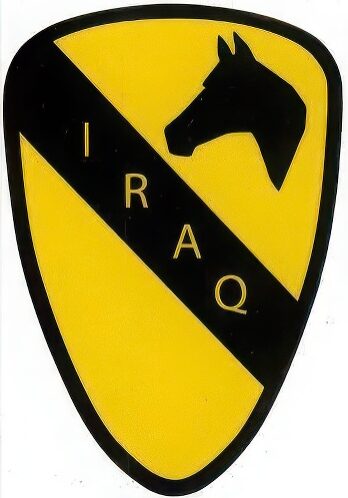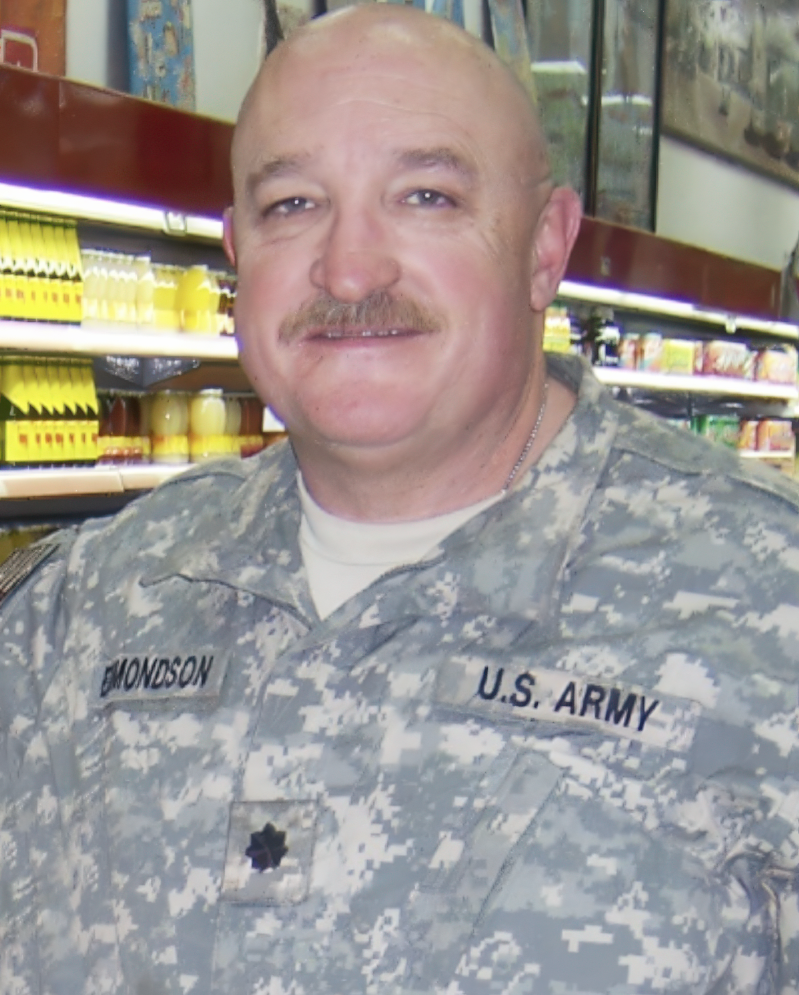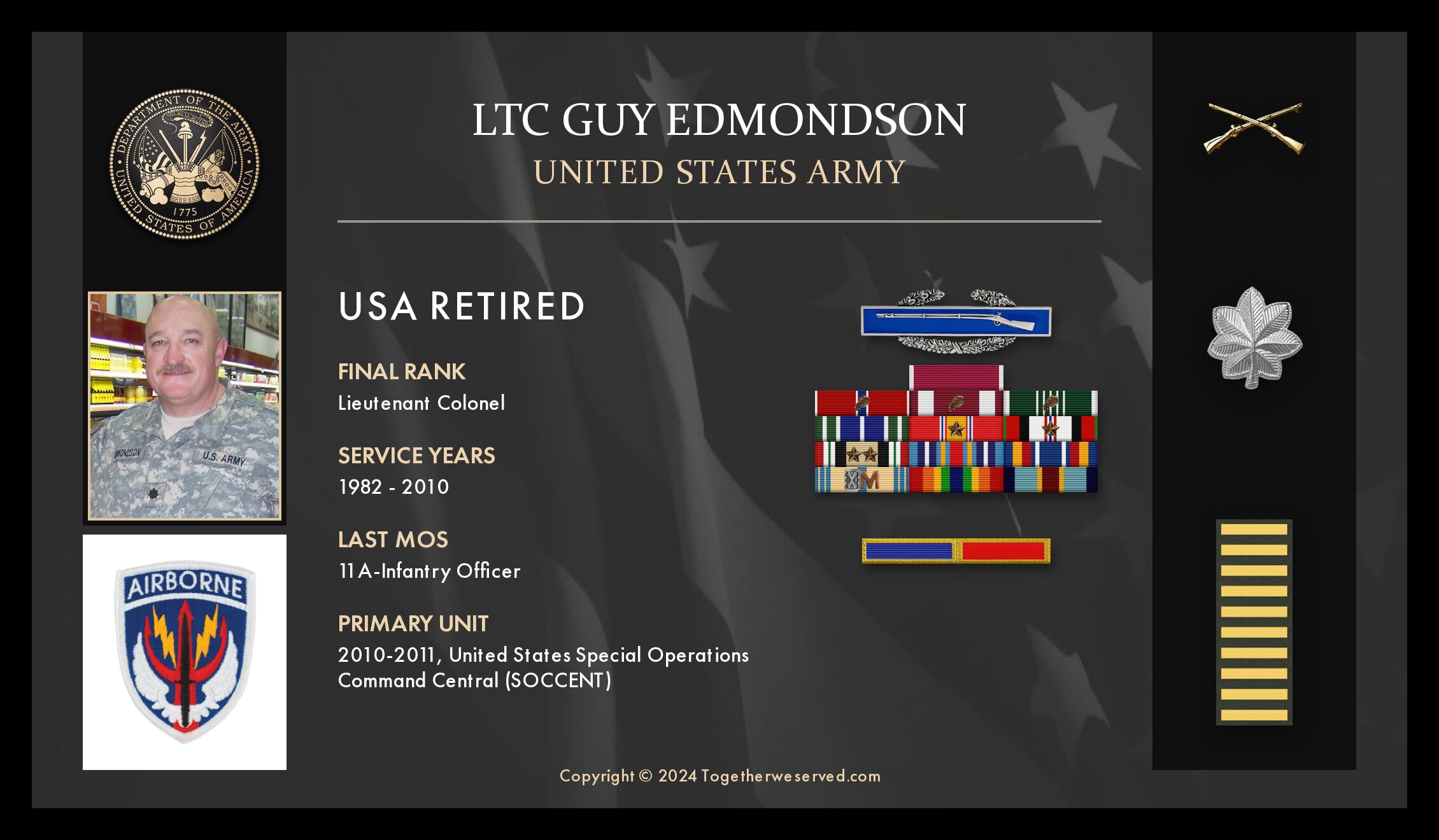PRESERVING A MILITARY LEGACY FOR FUTURE GENERATIONS
The following Reflections represents LTC Guy Edmondson’s legacy of his military service from 1982 to 2010. If you are a Veteran, consider preserving a record of your own military service, including your memories and photographs, on Togetherweserved.com (TWS), the leading archive of living military history. The following Service Reflections is an easy-to-complete self-interview, located on your TWS Military Service Page, which enables you to remember key people and events from your military service and the impact they made on your life. Start recording your own Military Memories HERE.
Please describe who or what influenced your decision to join the Army?

As a young man, I had no father figure in my life. My father passed away at the early age of 37 (I was 7 at the time). As I was entering my teenage years, my mother dated a retired Air Force Colonel who got me thinking about joining the military. I joined the ROTC Corps in high school and was mentored by a World War II veteran and a Viet Nam veteran, both retired Master Sergeants.
During my senior year in high school, my mother married the man who I consider to be my father. He pushed for me to continue my education in college. With his help, I got through college in only four and a half years. William “Chile” Childers assisted in putting my gold bars on and received my first salute. In exchange, he got a 1932 silver dollar from me.
In essence, it was not one person that influenced my decision to enter the service; it was a host of people. My high school instructors, a retired Air Force Colonel (Robert Hull), and my dad. All were equally responsible for my career.
Whether you were in the service for several years or as a career, please describe the direction or path you took. What was your reason for leaving?

I began my career as an Infantry Officer. As a student in IOBC, I saw the M2 Bradley Infantry Fighting Vehicle around the post. Since I was scheduled to be stationed at Ft. Benning, I requested to be assigned to the Bradley battalion on Kelley Hill. My request was granted, and I was assigned to the 1st Bn, 29th Infantry. The position as a platoon leader was unusual, as the battalion supported the Infantry School. With 63 Bradleys in the company, we spent a great deal of time in the motor pool. Later, I was assigned to HHC and was the support platoon leader and company XO. I questioned my future in the Army and, at one point, submitted my resignation. After a heart-to-heart with my wife, I decided to withdraw my resignation and moved my family to Ft. Carson, Colorado.
After a year with a line battalion (1/12 IN), my wife asked me to move to a position with more predictable schedules. I requested a move to a division job, and my battalion commander told me that he would approve my request with the caveat that my career was doomed. A week after my move to division, I awoke one day to find my wife of seven years and a friend of 21 had passed away during the night. My decision to move to a ‘page’ job meant that I was able to attend to my children after my wife’s passing. After a year at the division, I was moved back to a line battalion (1/12 IN) and completed a successful tour as a company commander.
As my time at Ft Carson came to a close, the Army decided to send me to the Army Signal Command’s advanced course for Automation, and I began my career as an Information Systems officer. I spent two and a half years in Germany as a Data Processing Unit Commander. My career in the army was less like a ship holding a course and more like a leaf going where the current would take me. All my experiences were good, but all good things must come to an end. The Cold War ended, and the Big Army began to drawdown. I saw the opportunity to return to Colorado and stabilize my family as my oldest was about to enter high school. I left the Army as a captain and used my new-found skills and experience to work as a supervisor in a data processing department of a publisher in Colorado Springs.
Seven years later, the Army would call for my service again, and I moved to Ft. McPherson, Georgia to work for the US Army’s Y2K Project Office to plan the transition into the 21st Century. Eighteen months later, I was out of a job (given 8 hours’ notice that my tour was over). I took a contractor position at the Army Reserve Command and thought that I would be in that position for a while. It was not to be.
On September 11th, 2001, our nation was attacked, and I was called to duty once more. Over the next nine years, I would be assigned to the Middle East five times, with tours at US Northern Command and the Army component to NORTHCOM. During my time in the Middle East, I was an operations officer, a mentor to the Iraqi Army, and a camp mayor. During my time in Iraq, I was proud to serve with two of my children, one in Mosul and one in Baghdad. Not many soldiers get to go to war with their child, much less two of them. Both made me proud of their service.
After my fourth tour in Iraq, I came home to retire and enjoy some home life. Four months later, I returned to Iraq as a contractor. But that is for another story…
If you participated in any military operations, including combat, humanitarian, and peacekeeping operations, please describe those that made a lasting impact on you and, if life-changing, in what way?

I would have to say that my time in Iraq, and especially in Mosul, was the most life-changing. My time in Mosul was spent as the adviser to the Iraqi Brigade Commander responsible for the security on the West side of the Tigris. In that capacity, I was side by side with my Iraqi counterpart seven days a week and generally around the clock. We ate and talked, had chai, and fought side by side. I came to see the Iraqi culture from a ground-level perspective. I saw how the Iraqi Army in Mosul, a predominately Sunni population, suffered from a lack of support from the Shia government in Baghdad. Almost half of my brigade were Kurds, and they were ferocious warriors. Why Mosul fell to ISIS so easily is a question I have no answer for. While I was there, my son was assigned to the base on the other side of the airfield. My proximity to him gave me the opportunity to keep an eye on him without being overbearing.
What I got from that tour was an appreciation of the wonderful life that we have in the United States. We live in the land of plenty, without fear of attack (mostly). It also taught me that the world is dangerous. One must be prepared to protect oneself. I learned that I should carry a gun because cops are too heavy to carry.
I went on to mentor other Iraqi and Afghan officers. The assignment to Mosul was by far the most significant. I watch the news about Mosul with great concern for those I fought with. I hope that the scourge of ISIS is removed from that city in the near future.
Of all your duty stations or assignments, which one do you have fondest memories of and why? Which was your least favorite?

I would have to say that my time in Iraq, between 2007 and 2009 was the time that I was able to serve with my kids. While it was more than one location (I was deployed for three years without a break), to share that time with my son and my daughter was a time that I hold near and dear to my heart.
From your entire service, including combat, describe the personal memories which have impacted you most?

I think that my first assignment was special. It was new and exciting, and it was where two of my six kids were born. I was one of the first soldiers trained on the Bradley Infantry Fighting Vehicle (BIFV) at Ft. Benning.
My assignment to Kuwait in 2001 was a game-changer. I made a difference in the Global War on Terrorism (GWOT) at that headquarters. It prepared me for my time in Iraq.
My career was sort of like Forrest Gump. So many memories, so many people have had an impact on my life.
What achievement(s) are you most proud of from your military career?

I got a handful of medals from my time overseas. I suspect that receiving my Combat Infantryman’s Badge was a special moment for me. I joined the Army in 1982 and, other than Viet Nam veterans, there were so few opportunities to earn that award.
Of all the medals, awards, formal presentations, qualification badges you received, or other memorabilia, which one is the most meaningful to you and why?

I have a number of tokens of appreciation in my man cave. I suppose that the Kurdish flag I received from my comrades in Mosul and the challenge coin I received from CSM Hill (GEN Patreus’ Sergeant Major) is high on my list of most cherished.
Which individual(s) from your time in the military stand out as having the most positive impact on you and why?

My first platoon Sergeant, Ronald O. Brumitt taught me a great deal about leading and following.
Maj (Ret) James Soper was my sounding board in Mosul under some trying conditions. He will always be a man that I will trust my life to.
Please recount the names of friends you served with, at which location, and what you remember most about them. Indicate those you are already in touch with and those you would like to make contact with.

Marc Paquin. 1/29 IN. My first buddy in the Army. Terrible golfer but a good friend.
Joel Weeks Forces Command and Kuwait. War Eagle!
Tom McCool. IGFC Military Transition Team. My first experience as a mentor.
Can you recount a particular incident from your service, which may or may not have been funny at the time, but still makes you laugh?

This is an easy one. After my first week in Mosul. I invited my son over to my compound to meet my team and have dinner. After a short time visiting, I had my XO come out of the operations center and shout “Sir, we have a firefight on the North end of town!! We need to move!!” I looked at my son and said: “Boy, my gunner is cooking steaks, can you gun for me?” He had this dear in the headlights look and nodded. My XO held up an IBA and said: “This will fit, put it on!”.
We spun up a truck and I had two of my NCOs help my son mount the M240B and we headed out towards the Iraqi compound. It was dark out and my son could not make out much. I asked him if he was ready to load the M240 and he said yes. I told him to stand down as this was a joke that we played on him When we got back to the compound, we all had a good laugh, to include my son.
What profession did you follow after your military service and what are you doing now?

After so much time in Iraq, it seemed natural for me to go back and continue to advise Iraqis. This time it was with the Iraqi Counter Terrorism Command. This led me into the world of Special Operations. Once we were disinvited from Iraq, I followed the drumbeat to Afghanistan, where I advised the Afghan counterpart of the IGFC. I found the Afghan war to be different in nature to the Iraq conflict.
After some health issues, I am now working for the County Sheriff’s Office at the jail. I have wanted to work for the Sheriff’s Office since I left the Army in 1993. The hours suck, but the staff is the first-rate. In addition to the jail job, I teach Homeland Security classes at one of the local universities.
In what ways has serving in the military influenced the way you have approached your life and your career? What do you miss most about your time in the service?

My time in the military has exposed me to a different breed of people. Duty to country is a foreign concept to many people today. It has been said that one percent of the people in the country served in the military I prefer to think of myself as one of the one-percenters. I have learned lessons that I have passed on to my children. I have found that the military loves volunteers and I was able to take advantage of the opportunities that I have had in the Army.
Based on your own experiences, what advice would you give to those who have recently joined the Army?

Understand that it is a privilege to serve this country. Take care of those heroes to your left and right and hope that they do the same for you. Ask for the hard assignments. You will benefit the most from them.
In what ways has TogetherWeServed.com helped you remember your military service and the friends you served with?

My profile was the first time that I sat down and put together the string of jobs that became a career. To put it together game me another opportunity to savor those assignments and the people that were part of them.
The forums bring to mind times past that I have filed away in my memory. The people that I interact with here are the types of people that got me into this line of work, to begin with.
PRESERVE YOUR OWN SERVICE MEMORIES!
Boot Camp, Units, Combat Operations
Join Togetherweserved.com to Create a Legacy of Your Service
U.S. Marine Corps, U.S. Navy, U.S. Air Force, U.S. Army, U.S. Coast Guard

0 Comments